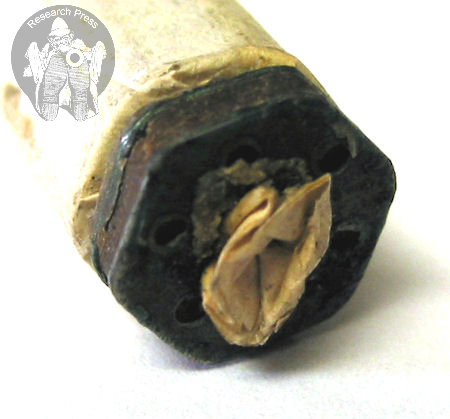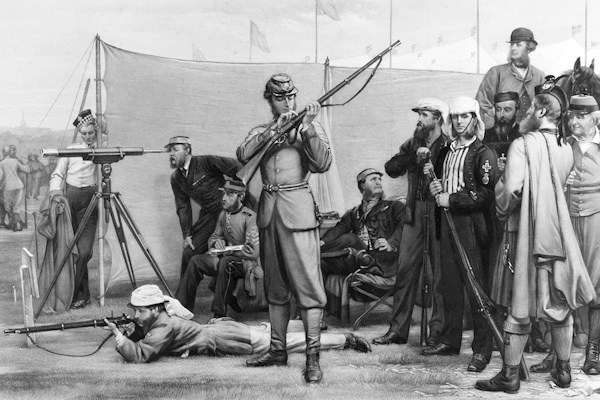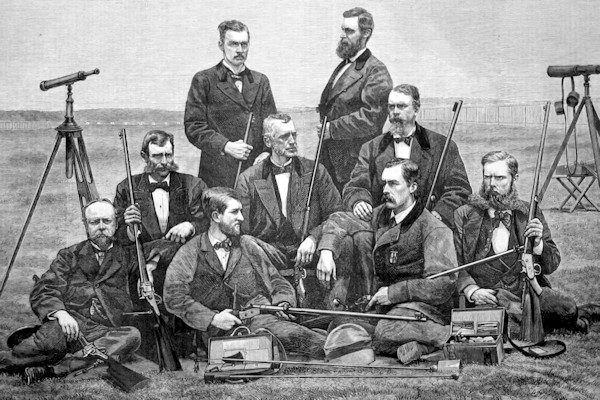You are here: Home > Marksmanship > 19th Century Riflemen
Whitworth Cartridges, the Queen’s Prize lost and Putney under fire!
The National Rifle Association (NRA) was established in 1859 “for the encouragement of Volunteer Rifle Corps and the promotion of rifle shooting throughout Great Britain.” When the NRA planned their inaugural Rifle Meeting in 1860, royal patronage came from Queen Victoria who offered encouragement by founding an annual prize that Volunteers competed for in two stages; the first at 300, 500 and 600 yards, and the second at 800, 900 and 1000 yards. Prize money was £250. From 1861, 200 yards replaced the 300 yards range.
For the first stage the long Enfield was used by competitors. The Enfield was however deemed of insufficient accuracy for the second stage and annual gunmakers trials were established to select a suitable rifle for issue to those reaching the second stage. Mr. Whitworth and a deputation of Birmingham gun makers contested the trials in 1860, with the Whitworth rifle being the clear winner. With the exception of 1865 when the trials were won by a Rigby rifle, the Whitworth prevailed winning each of the trails until the last which was held for the Queen’s Prize of 1866. The NRA subsequently obtained a supply of Whitworth rifles to be used by Queen’s Prize finalists until 1871, when for the first time the match was shot throughout with breech-loaders. The Snider replaced the Enfield in the first stage, and the War Office made a special issue of Martini-Henry’s for the second stage.
During the trials held in 1863, and while shooting at 500 yards, Mr. Whitworth breeched one of the Regulations governing them. The Regulation required “No cleaning out after trial shots, or during the 20 recorded shots, shall be allowed.” His breech was the use of a mechanically fitting ramrod constructed so as to push the lubricator wad down on the powder, and in doing so drive the fouling of the rifle down also, leaving a clean bore for the bullet. It was considered that this infringed the rule that no cleaning rod be used. The recorded shots were ordered to be cancelled, and the shots fired anew. In the end though there was only slight difference between the recorded targets and the Whitworth rifle emerged the winner.


Not to be out done by the regulations, Mr. Whitworth later transferred the scraper from the end of the rod to the base of the bullet itself, the whole contained within a cartridge. This idea was developed and improved upon by making the scraper double, and by introducing between the metal plates a thin layer of lubricating substance. Pictured above and right is a Whitworth cartridge, which although missing an outer wrapper does permit sight of the scraping discs and lubricating wad.
The year 1868 saw Corporal Peake of the 6th Lancashire finish 30th in the First Stage of the Queen’s Prize. This was enough to secure Peake £15 in prize money and advancement to the Second Stage where the top sixty riflemen were issued with Whitworth rifles to compete for the honour of the Queen’s Prize and its £250 prize money.
The competition took place on Tuesday 21 July, during which Peake fired the then highest recorded score in the event. When news of his winning achievement spread he was carried off accompanied by a band and feted by his fellow Volunteers. The celebrations were however short lived, a protest being lodged later that day that he had tampered with the supplied ammunition. Some press reports erroneously suggested that Peake had loaded from a powder flask.
In order that all competitors should load and fire under equal conditions the following was to have been complied with: “Competitors in the second stage of the Queen’s are to shoot with the made-up cartridges as issued on the ground from the tent of the armourer of the National Rifle Association.”
It seems it was an exceptionally hot at Wimbledon that year with temperatures reaching 128 deg.F in the sun and 101 deg.F in the shade! The suggestion was that in these extreme temperatures the lubricating properties of the Whitworth wad were poor, as the great heat tended to dry and harden the wad between the two pieces of metal. Witnesses alleged that Peake had replaced the wad with one giving better lubricating properties.
The NRA Council met to inquire into the circumstances of the allegation and after considering the evidence produced by both Peake and other witnesses issued the following statement:
Queen’s Prize (Second Stage)
The Council having inquired into an allegation made that Corporal Peak, of the 6th Lancashire Rifle Volunteers, a competitor for the Queen’s Prize, has in shooting for the second stage yesterday used a wad other than that prescribed by the regulations for the same, have decide that Corporal Peake has not complied with the regulations, and is therefore disqualified as a competitor for the prize; and that the Queen’s Prize be awarded to the competitor making the next highest score.
By order,
E. St. J. Mildmay
July 22, 1868
The gold medal and £250 prize were awarded to Lieut. J.B. Carslake of the 5th Somerset Rifle Volunteers.
Peake denied using anything other than the issued ammunition, although he did admit to having separated the bullet and wad in some instances, ramming them down individually rather than together. A later Court of Inquiry by the 1st Manchester Rifle Volunteers cleared Peake of using anything other than the issue wad, and concluded “It is, therefore, of opinion that Corporal Peake’s character for honourable dealing is in no way impugned by his conduct during the competition.”
It seems Corporal Peake’s troubles did not finish in 1868. The following year while practising in his tent with the loading and discharge of a breech loader and what he thought were “dummy” cartridges one happened to fire! Despite the bullet passing through several tents, through a wooden hoarding and heading in the direction of Putney, by some miracle, no one was injured. Peake reported the incident to the NRA and he was barred from further competitions in the meeting. Earlier in the week he had won the Prince of Wales’ prize valued at £100 which distinction he retained.

